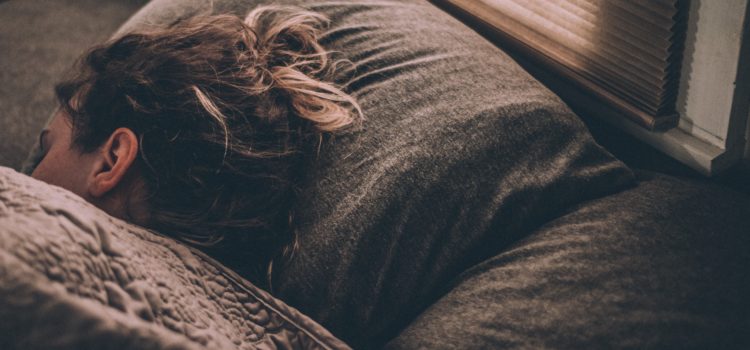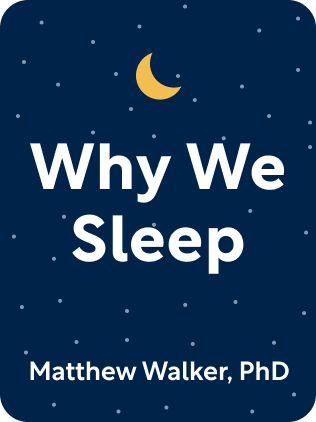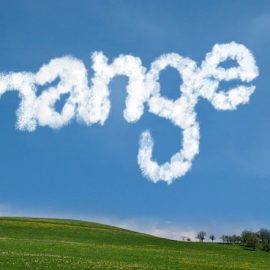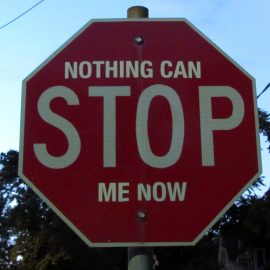

This article is an excerpt from the Shortform summary of "Why We Sleep" by Matthew Walker. Shortform has the world's best summaries of books you should be reading.
Like this article? Sign up for a free trial here .
Do you really need 8 hours of sleep? What happens if you don’t get 8 hours?
You do, in fact, need to sleep 8 hours a night in order to be at your best physically and emotionally. Find out how you can sleep 8 hours a night to help you improve your life.
Do You Need 8 Hours of Sleep?
Let’s return to the question of normal sleep amounts. Do you really need 8 hours of sleep?
On the lower end, you may have seen reports of hunter-gatherer tribes who sleep just 6.5 hours, leading to assertions that this is a universally “natural” state for all humans. They also are rarely obese.
But this is a misguided conclusion. In reality, the hunter-gatherer tribes are basically perpetually starving, since food is never abundant for long periods of time. Starvation naturally induces less sleep, so that animals stay awake longer to search for food. (This also decreases obesity).
To wit, the average life span is just 58 years, much shorter than humans in industrialized societies. In nutrition-rich situations, most humans need to sleep 8 hours.
Can you sleep too much? The other side of the question “Do you need 8 hours of sleep?” might refer to the need to sleep more. Some population studies show increased risk of death when sleeping over 9 hours, suggesting sleeping too much might be harmful. But the author argues this data is confounded by infection and cancers in long-sleeping people [though these confounds should already have been controlled for].
- Matthew Walker argues there is no evidence that sleeping more causes any health defects
Sleep in Humans
What’s the ideal human sleep pattern? Is it to sleep 8 hours, and do we really need 8 hours of sleep? Native pre-industrial tribes show a biphasic sleep pattern, with 7-8 hours at night and a 30-60 minute nap in the afternoon. At night, they sleep 2-3 hours after sunset, awaking around dawn.
- All people tend to have a dip in energy in mid-afternoon. (So if you’re scheduling a presentation, avoid the slot right after lunch.)
- A study of Greek siestas showed that people who abandoned siestas (due to political and social pressure) showed 37% increase risk of death from heart disease compared to those who maintained siestas.
What about supposed historical styles of sleeping, like segmented sleep (two periods of sleep at night, separated by a few hours of wakefulness)? The author argues this is mostly a cultural artifact, and not a natural way to sleep. No evidence suggests a biological desire to wake up for a few hours in the middle of the night
Relative to great apes, humans sleep less (8 hours in humans vs 10-15 hours in apes) and have more intense REM sleep (20% in humans vs 9% in apes). Matthew Walker hypothesizes this evolved as follows:
- Apes sleep in trees and enjoy great safety at night.
- In the human ancestor Homo erectus, an upright body posture and shorter arms made sleeping in trees more difficult. REM sleep is also dangerous in trees because limp muscles increases risk of falling out.
- Discovery of fire allowed humans to ward off predators and parasites at night. But danger still inevitably lurked, so humans who could sleep more efficiently for less time were evolutionarily selected for.
- Then as human societies became more complex, REM sleep became more important. REM sleep is found to be critical for 1) internal emotion regulation, 2) reading emotions from others, 3) creativity. This led to improved survival strategies and larger social groups, which further increased brain complexity and more need for REM sleep, forming a positive feedback loop.
How Sleep Changes from Childhood to Adulthood: The “Sleep 8 Hours” Advice
As you age, your need for sleep changes. Despite this change, the conventional wisdom to sleep 8 hours is offered consistently throughout your life.
Babies
Of course, babies don’t sleep for only 8 hours; they sleep much more. Fetuses spend almost all of the time in a sleep-like state. It doesn’t yet have the part of the brain that causes muscle-atonia during sleep, thus explaining why babies in the womb kick and punch.
During the last 2 weeks of pregnancy, REM sleep in fetuses ramps up to 12 hours a day. This causes rapid synaptogenesis and building of neural pathways throughout the brain. In experiments with rat fetuses, disturbing REM sleep stalls construction of the cerebral cortex.
Alcohol impedes REM sleep in fetuses and babies, causing abnormal synaptogenesis. Once disrupted, a fetal brain may never fully regain normal function.
- Newborns of alcoholic mothers spend far less time in REM sleep.
- 2 drinks reduce REM sleep and breathing rate in unborn infants.
- When babies drink milk containing alcohol, their REM sleep reduces by 30%.
Because REM sleep is involved in emotional recognition and social interaction, disrupting REM sleep in utero might contribute to autism spectrum.
- Autistic people show 30-50% less REM sleep than normal.
- Rats deprived of REM sleep develop into socially withdrawn adults.
Childhood
Do you need 8 hours of sleep as a kid, too? While starting with very irregular sleep, babies eventually show more regular sleep patterns starting at 4 months, as their suprachiasmatic nucleus and circadian rhythm develop.
With age, total time sleeping decreases, and the fraction of REM sleep decreases. Now that the synaptogenesis of REM tapers off, NREM plays a larger role in brain refinement, pruning the associations that are most valuable unique to that child’s life.
Consider NREM to actually cause cognitive development – changes in deep NREM sleep precede cognitive milestones, and the last maturation is in the frontal lobe, dealing with rationality.
Caffeine exposure during childhood could reduce NREM sleep, delaying brain maturation and learning.
Teens
In puberty, teens develop a later biological clock than adults, preferring to stay up later and wake later. This isn’t just teens being rebellious – it’s in their biological nature. Asking teens to sleep at 10PM is like asking adults to sleep at 7PM.
The author theorizes that this is evolutionarily helpful for teens to gain independence from their parents (having time to be awake while their parents are sleeping). Moreover, teens do so collectively, and so they get private time to socialize.
Unfortunately, in modern day, schools start at a very early hour (largely to match the circadian rhythms of adult parents). It’s far out of sync with the natural circadian rhythm of teens, so they tend to sleep late and wake up far earlier than they naturally would. So the question with teens isn’t, Do you need 8 hours of sleep? It’s, Do you really need 8 hours of sleep or more?
Considering all this, if you’re a parent, there’s no need to get frustrated at your teenage kid for seemingly being lazy and sleeping too much, when the environment is heavily geared against their biological tendencies.
Adulthood/Old Age
Do you need to sleep 8 hours as an adult? This is the time where you really need to focus on getting a quality 8 hours. Sleep quality starts deteriorating in the late 20s, with deep NREM sleep becoming impaired in length and power. In your late 40s, you’ll have lost 70% of deep sleep as a teenager; by 70, you’ll have lost 90% of deep sleep. Unfortunately, less NREM sleep worsens the ability to cement new memories in older people.
You often hear of the elderly sleeping little at night, so the natural conclusion is that the elderly just need less sleep. But this could be a myth. The elderly might be sleeping less because they’re unable to sleep for as long. This means they could still benefit from more sleep.
Seniors have three things going against them: 1) they sleep less, 2) they have less efficient sleep, and 3) they want to sleep earlier. This is caused by:
- Degeneration of the mid-frontal cortex that generates sleep
- Circadian rhythm shifting to earlier times
- Weakened bladders causing night interruptions
Exacerbating this are:
- We’re generally unable to determine our sleep quality after sleeping. So when seniors sleep poorly and feel unhealthy, they don’t realize they need to improve their sleep quality. They chalk it up to insomnia.
- Because the elderly sleep poorly, they feel tired during the day, and doze off in the early evening. Unfortunately, this reduces the adenosine sleep pressure at night, which causes them to have trouble falling asleep later. Then, their early circadian rhythm wakes them up before they can get a full night’s rest. This causes a vicious cycle of poor sleep.
All this causes lower sleep efficiency – people in their 70s have 80% sleep efficiency, meaning they stay awake in bed for 1.5 hours when trying to sleep 8.
There are a few ways to get around this:
- Melatonin helps strengthen the desire to sleep in elderly people. It reduces time to falling asleep and improves reported sleep quality.
- Seniors who want to push their circadian rhythm back should get bright-light exposure in the late afternoon, not in the mornings.
So do you really need 8 hours of sleep? Research shows that you do, in fact, need 8 hours of sleep per night. Not getting to sleep 8 hours can lead to consequences in addition to just being tired.

———End of Preview———
Like what you just read? Read the rest of the world's best summary of Matthew Walker's "Why We Sleep" at Shortform .
Here's what you'll find in our full Why We Sleep summary :
- Why you need way more sleep than you're currently getting
- How your brain rejuvenates itself during sleep, and why nothing can substitute for sleep
- The 11-item checklist to get more restful sleep today






